Stay Hungry, Stay Foolish
"You can't connect the dots looking forward, you can only connect them looking backwards."
~ Steve Jobs, from his 2005 Stanford Commencement Address
[Thanks JC!]
"You can't connect the dots looking forward, you can only connect them looking backwards."
~ Steve Jobs, from his 2005 Stanford Commencement Address
[Thanks JC!]
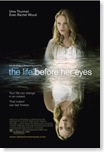 "When I was a kid, I went to a camp. Because I have a heart condition I was stuck with that were literally blue, kids my age that had to walk with a walker and being supported and all that. And I just have a small heart condition that I've compensated for, it's no problem in my life. I felt such a kinship with these kids at the time that I would read a book and then lie on a bunk late at night as we were supposed to sleep and tell them stories from that book. And invariably, they were condensed visual versions of the book. And so unknowingly, completely, without having any kind of film, I was kind of telling them films at that time."
"When I was a kid, I went to a camp. Because I have a heart condition I was stuck with that were literally blue, kids my age that had to walk with a walker and being supported and all that. And I just have a small heart condition that I've compensated for, it's no problem in my life. I felt such a kinship with these kids at the time that I would read a book and then lie on a bunk late at night as we were supposed to sleep and tell them stories from that book. And invariably, they were condensed visual versions of the book. And so unknowingly, completely, without having any kind of film, I was kind of telling them films at that time."
~ Vidam Perleman, discussing his recent adaptation of The Life Before Her Eyes into a film on KCRW's The Treatment (4.23.08). His first film was an adaptation of The House of Sand and Fog. Other projects in the works include an adaptation of Ayn Rand's Atlas Shrugged starring Angelina Jolie.
 Now began the part of her life where she was just very beautiful. Except for nothing. Only winners will know what this feels like. Have you ever wanted something very badly and then gotten it? Then you know that winning is many things, but it is never the thing you thought it would be. Poor people who win the lottery do not become rich people. They become poor people who won the lottery. She was a very beautiful person who was missing something very ugly. Her winnings were the absence of something, and this quality hung around her. There was so much potential in the imagined removal of the birthmark, any fool on the bus could play the game of guessing how perfect she would look without it. Now there was not this game to play, there was just a spent feeling. And she was not an idiot, she could sense it. In the first few months after the surgery she received many compliments, but they were always coupled with confusion.
Now began the part of her life where she was just very beautiful. Except for nothing. Only winners will know what this feels like. Have you ever wanted something very badly and then gotten it? Then you know that winning is many things, but it is never the thing you thought it would be. Poor people who win the lottery do not become rich people. They become poor people who won the lottery. She was a very beautiful person who was missing something very ugly. Her winnings were the absence of something, and this quality hung around her. There was so much potential in the imagined removal of the birthmark, any fool on the bus could play the game of guessing how perfect she would look without it. Now there was not this game to play, there was just a spent feeling. And she was not an idiot, she could sense it. In the first few months after the surgery she received many compliments, but they were always coupled with confusion.
~ Miranda July, from "Birthmark," The Paris Review #165 (Spring 2003)
The superrich make lousy neighbors—
they buy a house and tear it down
and build another, twice as big, and leave.
They're never there; they own so many
other houses, each demands a visit.
Entire neighborhoods called fashionable,
bustling with servants and masters, such as
Louisburg Square in Boston or Bel Air in L.A.,
are districts now like Wall Street after dark
or Tombstone once the silver boom went bust.
The essence of superrich is absence.
They like to demonstrate they can afford
to be elsewhere. Don't let them in.
Their riches form a kind of poverty.
~ by John Updike, from Americana: and Other Poems
"Whether awake or asleep, the brain constructs a model of reality—consciousness from the best available sources of information. During waking, those sources are external sensory input in combination with internal contextual and motivational information. During sleep, little external information is available, so consciousness is constructed from internal sources. These include expectations derived from past experience, and motivations-wishes, such as Freud observed, but also fears. The resulting experiences are what we call dreams. In these terms, dreaming is perception free from external sensory constraint, while perception is dreaming constrained by sensory input—hallucinations that happen to be true."
~ Stephen LaBerge, in response to the question Does Everybody Dream? (Information about dream recall and lucid dreaming at The Lucidity Institute.)
"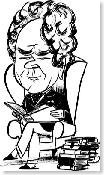 ...a chronological index of the thousand and twenty-three books that he has read since June, 1968. He has been recording their particulars neatly on sheets of loose-leaf paper—forty or so titles to a page—for nearly forty years. About a decade ago, he posted the list on his web site (which he pays a fan in Levittown to maintain). It begins with Rousseau’s “Confessions” and ends with Booth Tarkington’s “The Magnificent Ambersons,” which he finished before Christmas. In between, the list ticks off, at a rate of 2.16 books a month, a dazzling syllabus that’s a testament to steroidal self-improvement, as well as to the magical time-furnishing powers of royalty checks. Foucault, Balzac, Chesterton, Heidegger, Spinoza, Hazlitt, Milton, Proust: he has slayed them all, and let us know."
...a chronological index of the thousand and twenty-three books that he has read since June, 1968. He has been recording their particulars neatly on sheets of loose-leaf paper—forty or so titles to a page—for nearly forty years. About a decade ago, he posted the list on his web site (which he pays a fan in Levittown to maintain). It begins with Rousseau’s “Confessions” and ends with Booth Tarkington’s “The Magnificent Ambersons,” which he finished before Christmas. In between, the list ticks off, at a rate of 2.16 books a month, a dazzling syllabus that’s a testament to steroidal self-improvement, as well as to the magical time-furnishing powers of royalty checks. Foucault, Balzac, Chesterton, Heidegger, Spinoza, Hazlitt, Milton, Proust: he has slayed them all, and let us know."
From "The King of Reading," by Nick Paumgarten in The New Yorker (Jan. 28, 2008)
[Thanks Carolyn!]
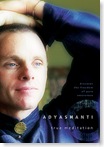 "So many people associate meditation with altered states of consciousness. Yet this is a profound misunderstanding about the potential of meditation. The potential I'm talking about is spiritual awakening, awakening to the realization of what you and everything actually is, the oneness of all. We are taught, or we assume, that to perceive everything as one and to perceive yourself as not separate is to enter an altered state of consciousness. And yet, it turns out, the truth is just the opposite. To perceive everything as one is not an altered state of consciousness. It's an unaltered state of consciousness; it's the natural state of consciousness. By comparison, everything else is an altered state."
"So many people associate meditation with altered states of consciousness. Yet this is a profound misunderstanding about the potential of meditation. The potential I'm talking about is spiritual awakening, awakening to the realization of what you and everything actually is, the oneness of all. We are taught, or we assume, that to perceive everything as one and to perceive yourself as not separate is to enter an altered state of consciousness. And yet, it turns out, the truth is just the opposite. To perceive everything as one is not an altered state of consciousness. It's an unaltered state of consciousness; it's the natural state of consciousness. By comparison, everything else is an altered state."
~ Adyashanti, from True Meditation
“They say that seeing is believing. But the opposite is true. Believing is seeing."
"I may focus your attention on a small and perhaps irrelevant detail, which I think is not so irrelevant. But there’s always an imposition of point of view in anything. There’s this crazy thinking that style guarantees truth. You go out with a hand-held camera, use available light, and somehow the truth emerges."
“The only thing I do that’s different from other people is I call attention to the fact that I have a point of view. I call attention to the fact that how we see, what we see, is constructed, and that looking at how it’s constructed is often a useful exercise.
“I think people want the appearance of truth. They don’t necessarily want the truth.”
~ Errol Morris, discussing his new film, Standard Operating Procedure in "Of Crime and Perception at Abu Ghraib," (New York Times, 4/20/08)
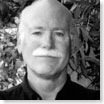 "The one thing I would say to a young writer who wanted counsel is to be patient. Time, which is your enemy in almost everything in this life, is your friend in writing. It is. If you can relax into time, not fight it, not fret at its passing, you will become better. You probably won’t be very good at the beginning, but you will become better and eventually you may become good."
"The one thing I would say to a young writer who wanted counsel is to be patient. Time, which is your enemy in almost everything in this life, is your friend in writing. It is. If you can relax into time, not fight it, not fret at its passing, you will become better. You probably won’t be very good at the beginning, but you will become better and eventually you may become good."
~ Tobias Wolff, "The Art of Fiction No. 183," The Paris Review (No. 171, Fall 2004)
"People need to talk. And often, a willingness to sit and listen is the greatest kindness one person can offer another. One of the first lessons of childhood is to be wary of strangers. And while this is good counsel to guard against the world's very small nefarious element, it also teaches us to block out the large majority of those who just have something on their minds they'd like to say. We are taught to be suspicious, especially of anyone who might not look like us or  share our beliefs. By the time we reach adulthood, many have perfected the art of isolation. Of being careful. Of not listening in the name of safety. But the truth is that we need to hear other people—all people—especially in those moments when we don't know exactly where we're going ourselves. When it comes to finding our way, we're better off taking in as much information from as many sources as possible...For the most part, wisdom comes in chips rather than blocks. You have to be willing to gather them constantly and from sources you never imagined to be probable. No one chip gives you the answer for everything. No one chip stays in the same place throughout your entire life. The secret is to keep adding voices, adding ideas, and moving things around as you put together your life. If you're lucky, putting together your life is a process that will last through every single day you're alive."
share our beliefs. By the time we reach adulthood, many have perfected the art of isolation. Of being careful. Of not listening in the name of safety. But the truth is that we need to hear other people—all people—especially in those moments when we don't know exactly where we're going ourselves. When it comes to finding our way, we're better off taking in as much information from as many sources as possible...For the most part, wisdom comes in chips rather than blocks. You have to be willing to gather them constantly and from sources you never imagined to be probable. No one chip gives you the answer for everything. No one chip stays in the same place throughout your entire life. The secret is to keep adding voices, adding ideas, and moving things around as you put together your life. If you're lucky, putting together your life is a process that will last through every single day you're alive."
~ Ann Patchett, from What Now? an essay based on the commencement address she gave at Sarah Lawrence in May 2006
 The puzzled ones, the Americans, go through their lives
The puzzled ones, the Americans, go through their lives
Buying what they are told to buy,
Pursuing their love affairs with the automobile,
Baseball and football, romance and beauty,
Enthusiastic as trained seals, going into debt, struggling —
True believers in liberty, and also security,
And of course sex — cheating on each other
For the most part only a little, mostly avoiding violence
Except at a vast blue distance, as between bombsight and earth,
Or on the violent screen, which they adore.
Those who are not Americans think Americans are happy
Because they are so filthy rich, but not so.
They are mostly puzzled and at a loss
As if someone pulled the floor out from under them,
They'd like to believe in God, or something, and they do try.
You can see it in their white faces at the supermarket and the gas station
— Not the immigrant faces, they know what they want,
Not the blacks, whose faces are hurt and proud —
The white faces, lipsticked, shaven, we do try
To keep smiling, for when we're smiling, the whole world
Smiles with us, but we feel we've lost
That loving feeling. Clouds ride by above us,
Rivers flow, toilets work, traffic lights work, barring floods, fires
And earthquakes, houses and streets appear stable
So what is it, this moon-shaped blankness?
What the hell is it? America is perplexed.
We would fix it if we knew what was broken.
by Alicia Suskin Ostriker, from No Heaven
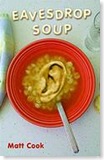 My body temperature was below normal; it was like 97.5—
My body temperature was below normal; it was like 97.5—
It was like I was turning into a radio station,
Which was fine, because my radio had stopped working—
The batteries had died, beautifully, with dignity, in their sleep.
The morning paper seemed beyond me, but it was below me.
A piece of gunk fell out of my eye
And landed on an Associated Press photograph.
Russian business leaders with faces like water balloons—
Then a story about children hiding in a leaf pile who were hit by a van.
Then the photograph of the demonstrator outside the Federal building—
It was impossible to tell if he was shouting or yawning.
Thank you Walt Whitman, for doing whatever it was you did
So that we don't have to write like they did before you came along.
~ Matt Cook, from Eavesdrop Soup
"Nearly a half-century ago, maverick neuroscientist Paul Bach-y-Rita discovered that it was possible to "rewire" the adult brain, connecting regions in ways no one ever had imagined. Today, his ideas have given a handful of blind people the ability to see for the first time—using their tongues."
Wired Science
[Thanks Nancy!]
"If you believe that despite the opportunities, achievements and acquisitions you already have, something is still missing, then Havidol may be right for you."
"The ultimate weakness of violence is that it is a descending spiral, begetting the very thing it seeks to destroy. Instead of diminishing evil, it multiplies it. Through violence you may murder the liar, but you cannot murder the lie, nor establish the truth. Through violence you murder the hater, but you do not murder hate. In fact, violence merely increases hate. Returning violence for violence multiplies violence, adding deeper darkness to a night already devoid of stars. Darkness cannot drive out darkness; only light can do that. Hate cannot drive out hate. Only love can do that."
~ Martin Luther King, Jr., Where Do We Go From Here? Chaos or Community
"When the eye finds nothing to see, that no-thingness is perceived as space. When the ear finds nothing to hear, that no-thingness is perceived as stillness. When the senses, which are designed to perceive form, meet an absence of form, the formless consciousness that lies behind perception and makes all perception, all experience, possible, is no longer obscured by form. When you contemplate the unfathomable depth of space or listen to the silence in the early hours before sunrise, something within you resonates with it as if in recognition. You sense that vast depth of space as your own depth, and you know that precious stillness that has no form to be more deeply who you are than any of the things that make up the content of your life."
...
"A sane, balanced, and fruitful human life is a dance between the two dimensions that make up reality: form and space. Most people are so identified with the dimensions of form, with sense perceptions, thoughts, and emotions, that the vital hidden half is missing from their lives. Their identification with form keeps them trapped in ego."
~ Eckhart Tolle, A New Earth: Awakening to Your Life's Purpose
"That's the revelation of twentieth-century drama. You can apply the Aristotelian unities to a microcosm, to a very, very small human interchange. You can take it apart. It didn't have to be about conquering France. It can be about who did or did not turn on the gas on the stove."
~ David Mamet, discussing the influences of Beckett and Pinter on his dramatic technique
On the other side of a mirror there's an inverse world,
where the insane go sane; where bones climb out of the
earth and recede to the first slime of love.
And in the evening the sun is just rising.
Lovers cry because they are a day younger, and soon
childhood robs them of their pleasure.
In such a world there is much sadness which, of course,
is joy.
The bird wedges its voice
into the silent crevices
between raindrops.
The shower fades and slips by
like the last time my daughter
came running from the playground to greet me,
her entire body smiling,
her face full of light,
to leap into my arms.
She is running toward me now,
again and again,
but first and last are as lost
as individual drops of rain.
When was the early bird
joined by the other members of the ensemble,
all gossiping now on the risers?
When did the air’s perfume
begin to drift away?
Taking the small hand of my attention,
which has again wandered back into
what was and what might be,
I gently guide it back to all this silence
which all this music seems to be written on.
Dazzling and tremendous how quick the sun-rise would kill me,
If I could not now and always send sun-rise out of me.
~ Walt Whitman, Leaves of Grass
Elvis Mitchell: In your movies there's a lot of vanity that the characters have. The characters pay a lot of attention to their looks, which is also really the province of young people, too, isn't it? I mean you're constantly sort of aware of the way you appear superficially. They like looking at themselves. They look really cool in those uniforms and that's a big part of it, too, these guys, so many of them have the flag tattooed on the bicep --
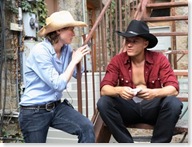 Kimberly Peirce: So there's two things there. One is masculinity, which I find really interesting because you really do have to perform masculinity in order to sustain it. It doesn't kind of just come naturally, even for men in a way...I originally got a hold of twenty soldier videos and they were putting cameras on sandbags, on gun turrets, inside Humvees, and--unfiltered—just recording their experience. But that wasn't enough. Then they were going back to their barracks and they were cutting them into, in a way, what was a fantasy of themselves.
Kimberly Peirce: So there's two things there. One is masculinity, which I find really interesting because you really do have to perform masculinity in order to sustain it. It doesn't kind of just come naturally, even for men in a way...I originally got a hold of twenty soldier videos and they were putting cameras on sandbags, on gun turrets, inside Humvees, and--unfiltered—just recording their experience. But that wasn't enough. Then they were going back to their barracks and they were cutting them into, in a way, what was a fantasy of themselves.
So they would take Toby Keith, I'm an American Soldier—I mean the words in the Toby Keith song are heartbreaking and great, it's kind of like, I'm just an average guy, but I happen to be at war, and I can't go home at night, and look at the sacrifices I go through—it's total heroism...Or it's the thrill kill stuff which is, Look at me, I'm powerful [Linkin Part, AC/DC, Rage Against the Machine]...It's like, Wow, America is powerful, don't screw with us...So when you talk about that narcissism or that sense of one's own image, when I look at these videos, I see, Wow, they're really trying to tell their own story, but in a way that really makes them look both heroic and strong and patriotic.
Discussing her film Stop-Loss on KCRW's The Treatment (4.02.08)
Is it possible he's traveled three thousand miles to the Movie Capital 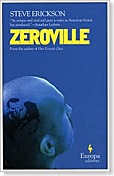 of the World only to find people who don't know the difference between Montgomery Clift and James Dean, who don't know the difference between Elizabeth Taylor and Natalie Wood? A few blocks north of Philippe's, the city starts to run out and Vikar turns back. He asks a girl with straight blond hair in a diaphanous granny dress where Hollywood is. Soon he notices that all the girls in Los Angeles have straight blond hair and diaphanous granny dresses.
of the World only to find people who don't know the difference between Montgomery Clift and James Dean, who don't know the difference between Elizabeth Taylor and Natalie Wood? A few blocks north of Philippe's, the city starts to run out and Vikar turns back. He asks a girl with straight blond hair in a diaphanous granny dress where Hollywood is. Soon he notices that all the girls in Los Angeles have straight blond hair and diaphanous granny dresses.
~ From Zeroville by Steve Erickson
Never be ashamed of kindergarten--
it is the alphabet's only temple.
~ Billy Collins, "Instructions to the Artist," from Questions About Angels: poems
"I produced this work in the last five years which was a time when our country was invested in finding secrets outside of its borders, whether it be weapons of mass destruction or to understand other cultures. And I wanted to look inward and find those hidden secrets within our borders."
~ Taryn Simon, talking about the idea behind her collection of photographs, An American Index of the Hidden and Unfamiliar
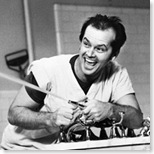 "We invent institutions to help make the world more just, more rational. Life in society would not be possible without orphanages, schools, courts, government offices, and mental hospitals, yet no sooner do they spring into being than they start to control us, regiment us, run our lives. They encourage dependency to perpetuate themselves and are threatened by strong personalities."
"We invent institutions to help make the world more just, more rational. Life in society would not be possible without orphanages, schools, courts, government offices, and mental hospitals, yet no sooner do they spring into being than they start to control us, regiment us, run our lives. They encourage dependency to perpetuate themselves and are threatened by strong personalities."
~ Miloš Forman, from Turnaround: a memoir
Spangled little girls take the stage,
choreographed to songs about
flirting, flaunting, and finding love.
The smallest ones don't yet know
the distinction between performer and audience,
but they are beginning to learn.
Their eyes are on each other,
their teachers tapping along silently in the wings,
and the tape glowing against the black floor.
They seem to remember best
the moves which involve holding hands
and forming lines,
the comfort of reaching out,
finding another set of searching fingers,
closing the circle.
The audience roars whenever
most of them spin clockwise
while one turns counter,
and when another stops dancing altogether,
puts her hand up to her forehead,
and peers out into the darkness.
A white ribbon
floats to the floor,
as they gather to form the final tableau.
One at a time,
each girl spots it and
reaches up to see if it belongs to her.
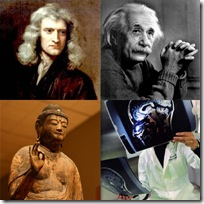 "Let's put it this way, Newton was incredible, but relativistic and quantum physics take it to a whole other level. They don't exactly replace Newton, but they're based on Newton. But they show us things that Newton could never have dreamed of.
"Let's put it this way, Newton was incredible, but relativistic and quantum physics take it to a whole other level. They don't exactly replace Newton, but they're based on Newton. But they show us things that Newton could never have dreamed of.
"If you had told Newton the results of relativity—I mean he could have eventually understood it—but upon first hearing something like E=mc² or that its essentially chance that's responsible for these forces, OK? Or the quantum view? Upon first hearing the relativistic or quantum view of physics, Newton would have freaked. Totally freaked. And yet, of course, eventually he'd understand it. But it takes it to a whole other thing.
"I believe that the Buddha was the Sir Isaac Newton of spirituality. Absolutely sui generis—in a class by himself. Now, what we need is an Albert Einstein and a Richard Feynman all trained in western science—neuroscience—to say, Oh and yes, by the way, here are the equations that describe enlightenment and here's some alternative interventions that can really speed the process along for the average person in this world."
~ Shinzen Young speaking with David Van Nuys on The Wise Counsel Podcast (April 1, 2008)
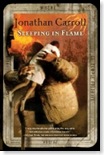 There are long quiet periods in life that are very much like waiting for a bus on a nice day. You don’t mind being there so much because the weather is sunny and nice, and you’re in no hurry. But after a while you start looking at your watch because there are more interesting things you could be doing, and it really is time the bus came.
There are long quiet periods in life that are very much like waiting for a bus on a nice day. You don’t mind being there so much because the weather is sunny and nice, and you’re in no hurry. But after a while you start looking at your watch because there are more interesting things you could be doing, and it really is time the bus came.
~ From Sleeping in Flame by Jonathan Carroll
 We had the unexpected treat of watching the first American film by Miloš Forman, Taking Off, at the Wexner Center last night as part of a traveling retrospective of his work.
We had the unexpected treat of watching the first American film by Miloš Forman, Taking Off, at the Wexner Center last night as part of a traveling retrospective of his work.
The director was present to discuss this satire from the early seventies about parents struggling to make sense of the counterculture which seemed to be driving their children away from them.
Mr. Forman told the audience about one of his earliest memories of the cinema. When he was a little boy living in Czechoslovakia, his parents took him to the city on a Saturday evening to see a film. It was a documentary about The Bartered Bride, an opera by Bedřich Smetana. But the film was silent. The way the singers mouths opened wide reminded him of fish. The opera was so familiar to the audience that they gradually began to sing the songs until the room was filled with their voices and emotion.
[Fresh Air interview from Feb. 15, 2008]
Kurt Andersen: Lt. Calley who was in the army in Vietnam was charged and prosecuted for killing civilian children, and that was one of those covers that was really shocking at the time. And I'm sure people said, Aw, this is in bad taste. We had those breakthroughs. I don't know that you can go to a newsstand today and find any cover among the hundreds of magazines there that are even attempting that kind of thing.
George Lois: Well, the point is, I think, that they're all infatuated with or they all believe that celebrity—pure celebrity—sells copies. And of course it might be true, but not when there's eighty magazines and they all got the same flavor of the month...
...
GL: What I try to teach young people...it's not just that ![]() experience of life, you have to have experience of—literally—art. When I say to them, When's the last time anybody here's been to the Metropolitan Museum of Art? and they look at you blankly. It's frightening. It's not just the shock of the new, it's the shock of the old. We have ten thousand years of visual experience that we can look at. It makes you what you are and feeds what you do in your work. It's very hard to get kids to understand that.
experience of life, you have to have experience of—literally—art. When I say to them, When's the last time anybody here's been to the Metropolitan Museum of Art? and they look at you blankly. It's frightening. It's not just the shock of the new, it's the shock of the old. We have ten thousand years of visual experience that we can look at. It makes you what you are and feeds what you do in your work. It's very hard to get kids to understand that.
From Studio 360 (Jan. 4, 2008)
"Automatization eats away at things, at clothes, at furniture, at our wives, and at our fear of war. If the complex life of many people takes place entirely on the level of the unconscious, then it's as if this life had never been.
"And so, in order to return sensation to our limbs, in order to make us feel objects, to make a stone feel stony, man has been given the tool of art. The purpose of art, then, is to lead us to a knowledge of a thing through the organ of sight instead of recognition.
"By enstranging objects and complicating form, the device of art makes perception long and laborious. The perceptual process in art has a purpose all its own and ought to be extended to the fullest. Art is a means of experiencing the process of creativity. The artifact itself is quite unimportant."
~ Victor Shklovsky, "Art as Device"
[Thanks Linda!]
pigeon strolls
wing fails
path veers
iridescent neck
red stare
amber eye
green blind
dust stirs
heart thrums
hope clings
light turns
end imagined
life snuffed
cars stopped
curb reached
Dear old friend, you continue to try to love me in spite of everything because you hold on to the hope that I might still be saved. I continue to try to love you in spite of everything because I hold onto the hope that I might be saved over and over again.
"How can lightness insist? I don't know why lightness isn't talked about, more valued, more pursued in poetry. I suspect it is out of the fear that one will be 'taken lightly.' But I ask, is there a sensation more exquisite than the feeling of having the burden of oneself borne off by a poem? The burden only, note; not the self. One's atoms are mysteriously distanced from one another. That is to say, one still has all one's atoms, but for the moment they are not the trouble they were."
~ Kay Ryan
The Edges of Time by Kay Ryan
It is at the edges
that time thins.
Time which had been
dense and viscous
as amber suspending
intentions like bees
unseizes them. A
humming begins,
apparently coming
from stacks of
put–off things or
just in back. A
racket of claims now,
as time flattens. A
glittering fan of things
competing to happen,
brilliant and urgent
as fish when seas
retreat.
"From the beginning, I would always object when people would say, 'It's the pet cemetery movie.' No, no, no, no! It's not about pet cemeteries. And the next question is always, 'If it's not about pet cemeteries, what is it about?' Well, that's tricky! In essence, it embodies many of the ideas that are in every single film I've made. The obsession with language. Eye contact. An interest in accounts of subjective experience rather than objective reporting. The fundamental belief that if you scratch the surface of any person, you will find a world of the insane, very close to that surface."
~ Errol Morris, talking about his film Gates of Heaven
[Commercials by Errol Morris]
A fuel leak in one of the engines.
Strangers become familiar,
united in a common obstacle,
the bittersweetness of unrealized dreams
never getting off the ground.
We are steered with smiles,
from the cramped seats we’d settled into,
friendships of compromise,
and abandoned into stagnant lines where
we can’t find a single uniformed person
who will look us in our eyes.
A membrane forms around our transitory clan,
bound by the surprising sting of being culled by chance.
Our coat of arms could feature a suitcase consumed by clouds.
Fingers fly madly over keyboards,
then hand us back-up plans typed out in secret code
on green paper that seems to have traveled from the past.
How could we have been so naïve
to trust the fickle seductions of flight?
Our rooms have been shunned
by people who are going places
and some of us have to ask for toothbrushes
designed specifically for
travelers who fail to expect the worst.
Our meal vouchers have no value
in this place with no restaurant
so we walk, where there are no sidewalks,
in clusters to nearby chains,
exactly like the ones from where we tried to leave
earlier in the day.
I enter the McDonald’s with a young man from China
who uses a name manufactured to make things easier on me,
but after a couple tries,
I still can’t quite make it out.
Back home, he says, most guys his age prefer KFC.
I feel embarrassed,
as if I am personally accountable
for the economies of scale that have
brought us to this hollowness of unlimited choices.
He studies computer science (materials) in East Lansing.
He tries to pay for his combo meal with the vouchers.
He tells me Shanghai is like New York City,
but Beijing is a better place to visit
because it has both the traditional and modern
at the same time.
The next morning,
they carefully search the grandma from Michigan among us
who is so nervous that she reacts to the metal detector
as if it were a trick question akin to a hole of miniature golf.
I chat over breakfast with a woman whose two daughters
are both single mothers living in California.
The one who is an oncology nurse is doing better
than the one whose husband passed away,
even though she,
the one who is doing better,
has been divorced twice.
Nurses Syndrome, she tells me,
means being attracted to men
who have a lot of needs.
Her daughter helped her find a good doctor to treat her cancer.
So far so good.
Back home, she and her husband run a furniture store.
They used to travel out west to buy merchandise,
but shipping rates have increased so much.
Now they just go to Chicago.
Soon they will be selling the business.
It doesn’t make as much money now
with so much competition from the bigger places.
And as we separate for our different gates,
there is a small ache braided into the comfort
of being back on course.

Daron Larson
Freelance Contemplative
